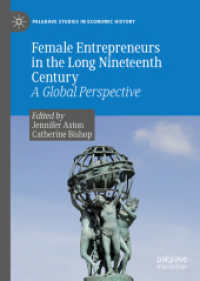- ホーム
- > 洋書
- > ドイツ書
- > Social Sciences, Jurisprudence & Economy
- > Politics, Society, Work
- > political science
Full Description
However, the COVID-19 pandemic of 2020 has brought about a sudden reversal of these trends and a renewed deterioration in the economic outlook, and an increase in social hardships that heralds a repeat of past failures in economic inclusion policies.






